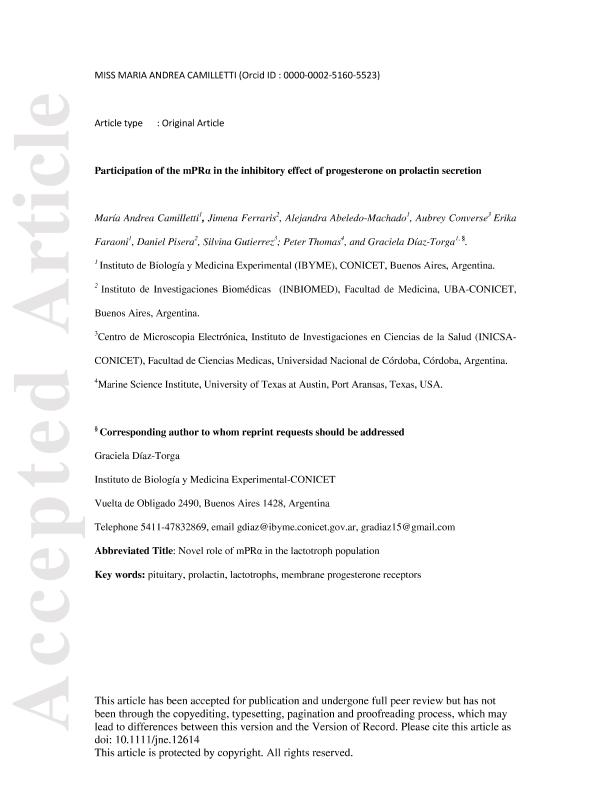Artículo
Participation of membrane progesterone receptor α in the inhibitory effect of progesterone on prolactin secretion
Camilletti, María Andrea ; Ferraris, Maria Jimena
; Ferraris, Maria Jimena ; Abeledo Machado, Alejandra Inés
; Abeledo Machado, Alejandra Inés ; Converse, Aubrey; Faraoni, Erika Yanil; Pisera, Daniel Alberto
; Converse, Aubrey; Faraoni, Erika Yanil; Pisera, Daniel Alberto ; Gutiérrez, Silvina
; Gutiérrez, Silvina ; Thomas, Peter; Díaz Torga, Graciela
; Thomas, Peter; Díaz Torga, Graciela
 ; Ferraris, Maria Jimena
; Ferraris, Maria Jimena ; Abeledo Machado, Alejandra Inés
; Abeledo Machado, Alejandra Inés ; Converse, Aubrey; Faraoni, Erika Yanil; Pisera, Daniel Alberto
; Converse, Aubrey; Faraoni, Erika Yanil; Pisera, Daniel Alberto ; Gutiérrez, Silvina
; Gutiérrez, Silvina ; Thomas, Peter; Díaz Torga, Graciela
; Thomas, Peter; Díaz Torga, Graciela
Fecha de publicación:
09/2018
Editorial:
Wiley Blackwell Publishing, Inc
Revista:
Journal of Neuroendocrinology
ISSN:
0953-8194
e-ISSN:
1365-2826
Idioma:
Inglés
Tipo de recurso:
Artículo publicado
Clasificación temática:
Resumen
The membrane progesterone receptors (mPRα, mPRβ, mPRγ, mPRδ and mPRε) are known to mediate rapid nongenomic progesterone functions in different cell types. However, the functions of these receptors in the pituitary have not been reported to date. In the present study, we show that the expression of mPRα was the highest among the mPRs in the rat anterior pituitary gland. Immunostaining of mPRα was detected in somatotrophs, gonadotrophs and lactotrophs. Interestingly, 63% of mPRα-positive cells within the pituitary were lactotrophs, suggesting that mPRα is involved in controlling prolactin (PRL) secretion in the pituitary. To test this hypothesis, rat pituitaries were incubated (1 hour) with either progesterone (P4) or the mPRα-specific agonist Org OD 02-0. PRL secretion was then measured by radioimmunoassay. The results of this experiment revealed that both P4 and Org OD 02-0 decreased PRL secretion. Moreover, the results from the GH3 cell line (CCL-82.1) showed that P4 and Org OD 02-0 inhibited PRL release, although the nuclear PR agonist R5020 was ineffective. Our investigation of the cellular mechanisms behind mPRα activity indicated that both P4 and Org OD 02-0 decreased cAMP accumulation, whereas R5020 was ineffective. In addition, the Org OD 02-0-effect on PRL release was blocked by pretreatment with pertussis toxin, an inhibitor of Go/Gi proteins. Because transforming growth factor (TGF)β1 is a potent inhibitor of PRL secretion in lactotrophs, we lastly evaluated whether TGFβ1 was activated by progesterone and whether this effect was mediated by mPRα. Our results showed that P4 and Org OD 02-0, but not R5020, increased active TGFβ1 levels. This effect was not observed when cells were transfected with mPRα-small interfering RNA. Taken together, these data provide new evidence suggesting that mPRα mediates the progesterone inhibitory effect on PRL secretion through both decreases in cAMP levels and activation of TGFβ1 in the lactotroph population.
Palabras clave:
LACTOTROPHS
,
MEMBRANE PROGESTERONE RECEPTORS
,
PITUITARY
,
PROLACTIN
Archivos asociados
Licencia
Identificadores
Colecciones
Articulos(BIOMED)
Articulos de INSTITUTO DE INVESTIGACIONES BIOMEDICAS
Articulos de INSTITUTO DE INVESTIGACIONES BIOMEDICAS
Articulos(INBIOMED)
Articulos de INSTITUTO DE INVESTIGACIONES BIOMEDICAS
Articulos de INSTITUTO DE INVESTIGACIONES BIOMEDICAS
Citación
Camilletti, María Andrea; Ferraris, Maria Jimena; Abeledo Machado, Alejandra Inés; Converse, Aubrey; Faraoni, Erika Yanil; et al.; Participation of membrane progesterone receptor α in the inhibitory effect of progesterone on prolactin secretion; Wiley Blackwell Publishing, Inc; Journal of Neuroendocrinology; 30; 9; 9-2018; 1-32
Compartir
Altmétricas



